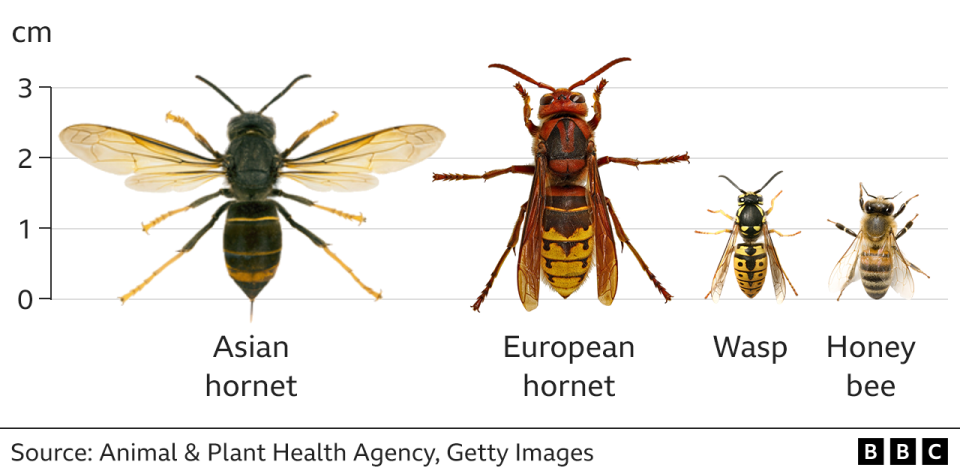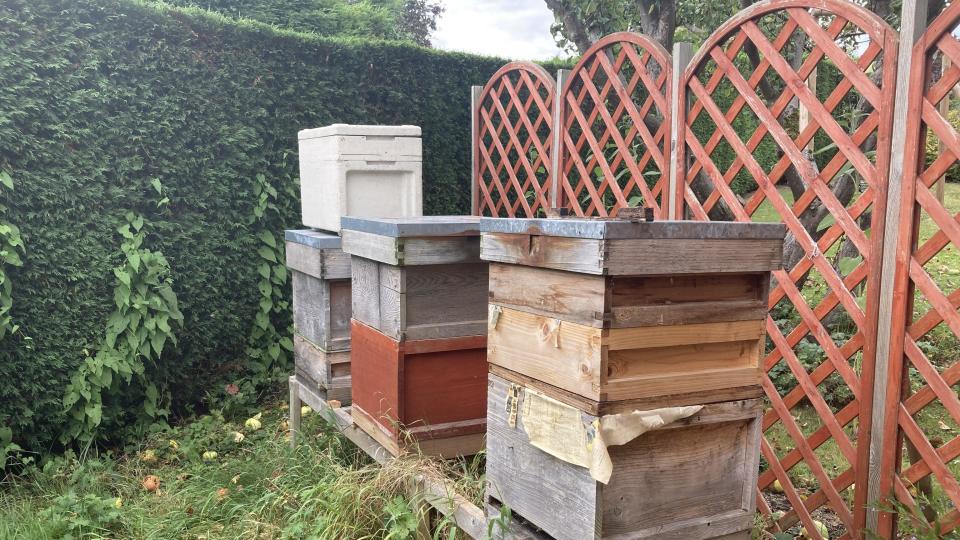Why are there so many Asian hornets?
Asian hornets are threatening the UK’s honey bees after record numbers were reported in 2023 with more sightings already this year - but why are there so many?
The government said last year saw 72 nests destroyed in 56 locations, with the majority found in Kent.
Asian hornets feed on insects and are a threat to bees, because they like to feed young bee grubs and dismembered adult bee thoraxes to their young, beekeepers say.
In the spring, Asian hornet queens first establish low-lying nests the size of a fist – often seen in hedges, barns and garages – before the autumn, when secondary nests up to a metre-wide are established high up in the trees, Kent beekeeper David Cockburn explained.

The Kent Beekeepers’ Association's former chairman said the first Asian hornet was thought to have arrived in Bordeaux about 10 years ago after it “hitched a ride” in a shipment of ceramic pots, and the species then spread across France.
He was on holiday in the Dordogne, when a French beekeeper described to him the scale of the problem as catastrophic, with the words “c’est la catastrophe”.
Since then, Asian hornets have spread across northern Portugal and the Netherlands and the Low Countries, he said.
Mr Cockburn said the species could affect the UK’s animal and insect populations.
Asian hornets eat insects, as do familiar birds such as sparrows and robins, and the impact could be felt up the entire food chain, Mr Cockburn said.
“There hasn’t been a problem here until recently,” he said. “We were protected because we are an island. But last spring, there was an easterly wind from Europe bringing them across on the wind, and I noticed one [an easterly wind] today.”
In an appeal to people to report sightings, Mr Cockburn said spring provided an opportunity, because it was possible to find and destroy nests while they are smaller and visible.
Last autumn, about 1,000 Kent beekeepers went out to help the National Bee Unit find and eradicate nests, he said.

Paul Hetherington, spokesman for charity Buglife, said honey bees normally produce one queen per nest and wasps can produce several, but Asian hornets can produce 10.
He said nests were destroyed in Kent in September and October last year, but most of the new queens would have already escaped.
Mr Hetherington said climate change could be a defence against Asian hornets.
Originating from Asian areas such as Nepal and Mongolia, Asian hornets prefer a cold, dry climate and like to hibernate in temperatures below 5 degrees, he said.
“Traditionally, we had a cold and dry winter, but now it’s wet and warm. Mould starts to grow on insects and the human equivalent of that is cancer, so climate change might be a defending factor,” he explained.
Mr Hetherington said Asian hornets were able to fly across the Channel, which could explain why they had been found in Kent, but others found further north were likely to have come from imports.
One was found in Northumberland last year.
Plants ranging from trees and marigolds to Brussels sprouts are imported from Europe in containers of soil, he said.
He said the UK had “a more or less unrestricted flow” of products containing soil, and he said steps could have been taken to bring in stricter import controls.
“The question is how much money is the government spending at the moment on destroying nests,” he asked.
Wildlife trusts have also warned that the hornet can be accidentally imported through goods such as timber, soil, fruit, potted plants and cut flowers, although they state the species is most likely to be found in southern England.
'Seasonal conditions'
A Defra spokeswoman said strict border checks are in place to protect the country's biosecurity against costly diseases reaching the UK and harming the natural environment.
She added: “These include measures to stop the introduction of soil-borne pests reaching the UK from outbreak locations, while soil imported from non-EU countries is prohibited and must meet specific requirements when attached to plants."
Defra said increased hornet presence was due to a variety of factors including higher population levels of hornets in Europe and the Channel Islands - meaning more found their way across the Channel - and seasonal conditions, such as warm summers and winters.
Defra’s Chief Plant and Bee Health Officer Nicola Spence has appealed to the public to be vigilant and said: “By ensuring we are alerted to possible sightings as early as possible, we can take swift and effective action to stamp out the threat posed by Asian hornets.
"That’s why we are working at speed to locate and investigate any nests in the area following the confirmed sightings in Kent."
People can report sightings through the Asian hornet app or online, she added.
The Animal & Plant Health Agency has tweeted that its garden at the Chelsea Flower Show had won a gold medal.
The exhibit raised awareness of pollinators and the threat presented by Asian hornets.
Follow BBC Kent on Facebook, on X, and on Instagram. Send your story ideas to southeasttoday@bbc.co.uk or WhatsApp us on 08081 002250.

